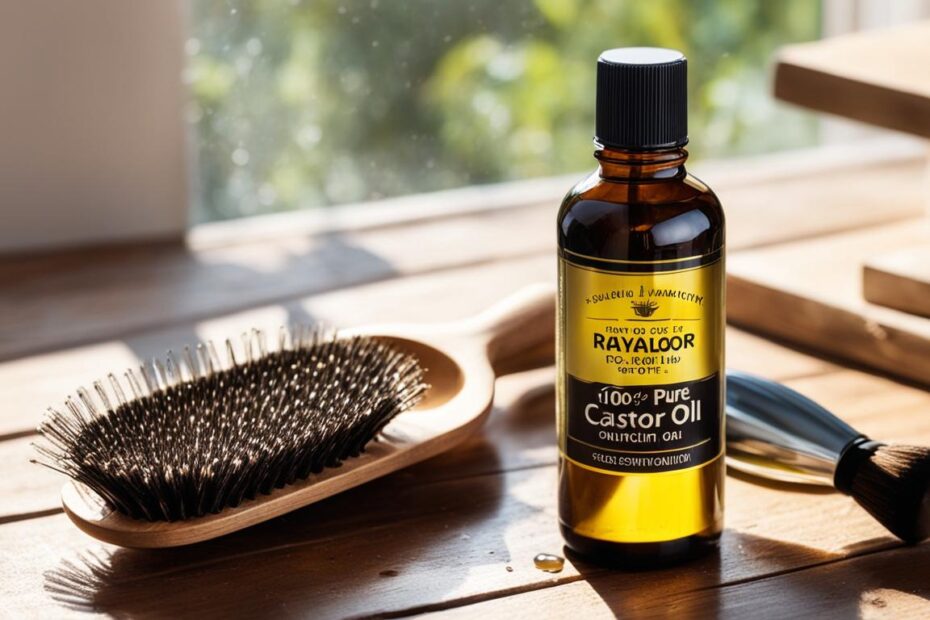There is a popular belief that castor oil can thicken thin hair and promote hair growth. However, is there any scientific evidence to support this claim? Let’s explore the facts and separate myth from reality.
According to multiple sources, including cosmetic chemists and dermatologists, there is no scientific evidence to support the claim that castor oil helps thicken thin hair or promotes hair growth. The anecdotal testimonials found on blogs, Reddit, and YouTube should be considered as personal opinions rather than scientific facts. While castor oil may have some benefits for the hair and scalp, such as improving flexibility and nourishment, its ability to promote hair regrowth is still speculative at this point.
Key Takeaways:
- There is no scientific evidence to support the claim that castor oil helps thicken thin hair or promotes hair growth.
- Anecdotal testimonials should be considered as personal opinions rather than scientific facts.
- Castor oil may have some benefits for the hair and scalp, such as improving flexibility and nourishment.
The potential benefits of castor oil for hair health
When it comes to maintaining hair health, castor oil has gained popularity as a natural remedy. While there is no scientific evidence to fully support its benefits, some individuals have reported improvements in their hair and scalp health after using castor oil. Let’s explore the potential benefits of castor oil for hair health.
Boosting Scalp Circulation: Castor oil contains ricinoleic acid, which is believed to enhance scalp circulation. Improved blood flow to the scalp can potentially promote healthier hair growth and strengthen the hair follicles.
Combatting Bacterial and Fungal Overgrowth: Castor oil possesses antimicrobial properties that may help fight off bacterial or fungal overgrowth on the scalp. This can reduce inflammation and protect the hair follicles from damage.
Strengthening Hair: While not scientifically proven, some individuals claim that castor oil can make their hair stronger and more resilient. This may be attributed to the nourishing properties of castor oil, which can help prevent breakage and enhance overall hair health.
It is important to note that castor oil may not be suitable for everyone. Some individuals may be allergic to it, leading to scalp inflammation. It is recommended to perform a patch test before applying castor oil to the entire scalp.
Potential Benefits of Castor Oil for Hair Health
| Benefit | Description |
|---|---|
| Improved Scalp Circulation | Enhances blood flow to the scalp, potentially promoting healthier hair growth. |
| Antimicrobial Properties | Fights bacterial or fungal overgrowth on the scalp, reducing inflammation and protecting hair follicles. |
| Stronger Hair | Nourishes the hair, potentially reducing breakage and improving overall hair strength. |
The indirect effects of castor oil on hair growth
While there is no direct evidence linking the application of castor oil to hair growth, its anti-inflammatory properties may indirectly support the growth of healthy hair. Castor oil is rich in omega-6 and omega-9 fatty acids and vitamin E, which contribute to its anti-inflammatory effects. These properties can improve scalp health, creating a favorable environment for hair growth.
It is important to note that castor oil is most effective for inflammatory hair loss conditions and may have minimal impact on severe male or female pattern hair loss or nutritional hair loss. However, its ability to reduce inflammation can be beneficial for those experiencing hair loss due to inflammation or scalp conditions.
“Castor oil’s anti-inflammatory properties can improve scalp health, creating an optimal environment for hair growth.”
The Role of Anti-inflammatory Properties
One of the key factors that can hinder hair growth is inflammation. Inflammatory conditions, such as dermatitis or scalp psoriasis, can disrupt the hair growth cycle and lead to hair loss. Castor oil’s anti-inflammatory properties can help mitigate scalp inflammation and reduce damage to hair follicles.
Furthermore, castor oil’s anti-inflammatory effects can address other scalp conditions, including dandruff and seborrheic dermatitis, which may contribute to hair loss. By soothing the scalp and reducing inflammation, castor oil can create an environment that supports healthy hair growth.
Additional Benefits for Hair Health
Beyond its indirect effects on hair growth through anti-inflammatory properties, castor oil offers other benefits for overall hair health. It acts as a moisturizer, nourishing the hair shaft and promoting elasticity, which can reduce breakage and split ends.
Moreover, the antimicrobial properties of castor oil can help control bacterial and fungal overgrowth on the scalp, preventing potential infections that may hinder hair growth. Keeping the scalp clean and balanced can contribute to the overall health and vitality of the hair.
To summarize, while castor oil may not directly stimulate hair growth, its anti-inflammatory properties and other benefits can indirectly support the growth of healthy hair. By improving scalp health, reducing inflammation, and promoting overall hair well-being, castor oil can create an optimal environment for hair growth in individuals facing inflammatory hair loss conditions.

How to Use Castor Oil for Hair Health
To maintain optimal hair health, it is important to know how to properly use castor oil. By following the right application methods and frequency of use, you can maximize the benefits of this natural oil for your hair.
Here is a step-by-step guide to help you incorporate castor oil into your hair care routine:
- Choose high-quality castor oil: Look for cold-pressed, organic castor oil to ensure the highest potency and purity.
- Mix with coconut oil: For a less sticky consistency, mix equal parts castor oil and coconut oil. This will help prevent buildup and make application easier.
- Apply to the scalp and hair: Using your fingertips, gently massage the oil mixture onto your scalp. Ensure even distribution by working it through your hair, focusing on the roots and ends.
- Leave it on for at least two hours: To allow the oil to penetrate the scalp and hair follicles, leave it on for a minimum of two hours. For best results, you can even leave it on overnight.
- Wash with shampoo and conditioner: After the desired amount of time has passed, thoroughly wash your hair with a gentle shampoo and conditioner to remove any residue.
By following these application methods, you can effectively harness the potential benefits of castor oil for hair health.
Remember, consistency is key when using castor oil. It is recommended to apply it two to three times per week for optimal results. However, if you have severe hair concerns, such as excessive hair loss or scalp issues, you can use it daily, but make sure to mix it with coconut oil to prevent sticky buildup.
Testimonial:
“Using castor oil on my hair has been a game-changer. I apply it twice a week, and I’ve noticed improved hair health and a reduction in hair breakage. It’s become an essential part of my hair care routine!” – Jenna, Regular Castor Oil User
Try incorporating castor oil into your hair care routine and see if it works for you. However, keep in mind that individual results may vary. If you have any concerns or specific hair conditions, it is always best to consult with a healthcare provider or dermatologist for personalized advice.
The effectiveness of castor oil for hair growth
The evidence for castor oil’s effectiveness in promoting hair growth is largely anecdotal, with little clinical evidence to support the claims. While some individuals claim that using castor oil once a month can accelerate hair growth, there is no scientific proof to back up this claim. However, for those interested in trying castor oil on their hair, it can be applied using a safe, at-home method. It is important to note that discussing hair loss treatments with a healthcare provider is recommended for more effective and proven solutions.

Throughout various online platforms, many people swear by the benefits of using castor oil for hair growth. However, it is crucial to distinguish between anecdotal claims and clinical evidence. While anecdotal stories can provide insights and personal experiences, they do not constitute scientific validation.
Scientific studies on the direct impact of castor oil on hair growth are limited. Currently, there is no research that conclusively proves that castor oil directly stimulates hair growth. The potential benefits of castor oil for enhancing hair growth are primarily based on anecdotal evidence and personal testimonials shared on blogs, social media, and online forums.
“I’ve been using castor oil on my hair for the past six months, and I’ve noticed a significant improvement in the thickness and length. It truly works wonders!” – User123, Haircare Enthusiast
While personal accounts can offer inspiration and motivation, it is essential to approach them with a critical mindset and recognize the absence of scientific validation. Without substantial clinical evidence, any claims regarding castor oil’s hair growth properties should be viewed as speculative and not guaranteed outcomes.
Despite the lack of strong clinical evidence, the popularity of castor oil for hair growth persists. This may be attributed to individual variations and unique responses to the oil. Some people may experience positive effects due to factors such as scalp health improvement, increased blood circulation, or general hair nourishment.
If you decide to use castor oil for hair growth, it is recommended to approach it as an at-home, experimental treatment rather than a scientifically proven solution. Keep in mind that results may vary, and it may take time to evaluate the efficacy.
When applying castor oil to the hair, it is important to follow proper application methods. Gently massage the oil into the scalp, ensuring even distribution. Leave it on for at least two hours before washing it out with shampoo and conditioner. This allows sufficient time for the oil to penetrate the scalp and hair follicles.
Tips for using castor oil for hair growth:
- Perform a patch test on a small area of skin to check for any allergic reactions or sensitivities before applying castor oil to your hair and scalp.
- Avoid using a large amount of castor oil, as it may lead to greasiness and difficulty in washing it out.
- Consider mixing castor oil with a carrier oil, such as coconut oil, to create a more manageable and spreadable consistency.
- Be patient and consistent with the application of castor oil. Results, if any, may take time to become noticeable.
Remember, while castor oil may offer some benefits for hair health, such as moisturization and nourishment, its ability to promote significant hair growth remains unproven by clinical evidence. For a comprehensive and evidence-based approach to hair growth, consulting with a healthcare provider or dermatologist is recommended.
Conclusion
While castor oil has been touted for its potential benefits in promoting hair health, it is important to note that scientific evidence supporting its ability to thicken thin hair or stimulate significant hair growth is lacking. The claims made by individuals based on their personal experiences and anecdotal testimonials should be approached with caution.
For those seeking evidence-based solutions for hair growth, we recommend consulting with a healthcare provider or dermatologist. They can provide expert advice and recommend appropriate treatments tailored to your specific needs and hair conditions.
While castor oil may offer some advantages, such as improving scalp circulation, nourishing the hair, and reducing inflammation, it is essential to explore proven and effective options for hair growth. By seeking professional guidance, you can ensure that you are making informed decisions and accessing treatments that have solid scientific backing.
FAQ
Does castor oil help thicken thin hair?
According to multiple sources, there is no scientific evidence to support the claim that castor oil helps thicken thin hair. While castor oil may have some benefits for hair and scalp health, its ability to promote hair growth is still speculative at this point.
What are the potential benefits of castor oil for hair health?
Castor oil contains ricinoleic acid, which is believed to boost circulation in the scalp and has antimicrobial properties that may help reduce inflammation and damage to the hair follicles. While these benefits are not proven by scientific evidence, some individuals have noticed improvements in their hair and scalp health after using castor oil.
What are the indirect effects of castor oil on hair growth?
Although there is no direct evidence that castor oil stimulates hair growth, its anti-inflammatory properties can improve scalp health and create a favorable environment for hair growth. However, castor oil may be most effective for inflammatory hair loss conditions and may have minimal impact on severe pattern hair loss.
How should I use castor oil for hair health?
It is recommended to apply castor oil to the scalp and hair two to three times per week. In severe cases, it can be used daily, but mixing it with 50 percent coconut oil can help prevent sticky buildup. The oil should be gently massaged into the scalp and evenly applied to the hair. It is important to leave the oil on for at least two hours before washing with shampoo and conditioner.
What is the effectiveness of castor oil for hair growth?
The evidence for castor oil’s effectiveness in promoting hair growth is largely anecdotal, with little clinical evidence to support the claims. While some individuals claim that using castor oil once a month can accelerate hair growth, there is no scientific proof to back up this claim. Consulting with a healthcare provider or dermatologist for more effective and proven solutions for hair growth is recommended.
What is the conclusion regarding castor oil for hair health and growth?
While castor oil may have some benefits for hair health, such as improving scalp circulation and reducing inflammation, its ability to thicken thin hair or promote significant hair growth is not supported by scientific evidence. Individuals seeking effective and evidence-based solutions for hair growth should consult with a healthcare provider or dermatologist for appropriate treatments and recommendations based on their specific needs and hair conditions.




